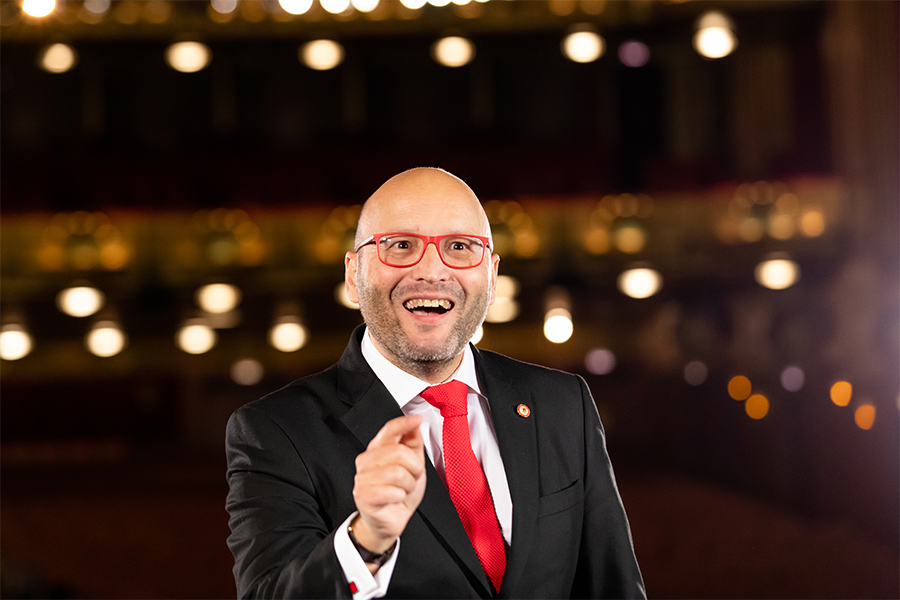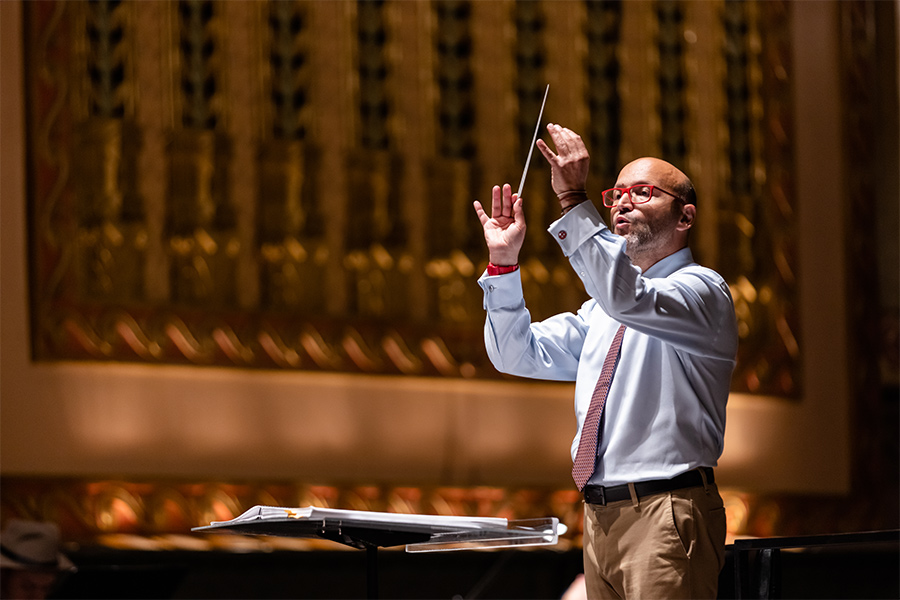September 13, 2021
Pure pleasure: Lyric Music Director Enrique Mazzola on bel canto opera and The Elixir of Love
The term Bel Canto (“Beautiful Singing”) is generally understood to indicate the elegant Italian vocal style of the late eighteenth and early nineteenth centuries. Would you agree that the art and practice of bel canto are sometimes misunderstood today?
This is a simple but difficult question, and I’m not sure I can give a comprehensive answer. What is clear to me is that bel canto has been underappreciated. In many of today’s European opera houses, when you suggest, “Let’s do a bel canto opera,” the first thing people say is, “We don’t need many rehearsals [because] it’s so easy to perform.” Wrong! Actually, to do a bel canto opera properly, you need more rehearsal than with a Wagner opera. That shocks many artistic and stage directors when I say it.
There would be no Wagner or Richard Strauss without Bellini, without early-Romantic Italian opera. The seeds of late nineteenth-century Romantic opera were sown in the bel canto repertoire. If we fail to perform early nineteenth-century operas correctly, we can’t do German Romantic opera well. We know from Wagner’s writings that he appreciated the purity of Bellini’s melodic lines.
The stereotype of the bel canto orchestra is that it serves as little more than blanc accompaniment for the singers.
It’s not true that the orchestra is a mere accompanimental tool in bel canto opera; it has a very important harmonic and structural role. As an example of the former, you need only observe how Bellini uses the orchestra in the famous aria “Casta diva” from Norma. The melodic line is supported by a simple arpeggio that confirms the harmonic spectrum in which the soprano is singing. The orchestration here is so minimalistic that you could imagine it was written by Philip Glass! Shifts between tonic and dominant chords allow the singers and audience to feel comfortable with this steady harmonic pattern. A single note in the arpeggio can change the harmony or suggest to the singer that they have to be very careful at the end of the phrase.
Bel canto singers of the early nineteenth century enjoyed much more latitude with respect to interpreting what’s in the score than singers today. How much interpretative freedom should a conductor allow today’s artists, without surrendering necessary control from the podium?
I have a theory I’ve put into practice that has become my “signature” when conducting bel canto repertoire. On the first day of rehearsal, I explain to my singers that because the role of the opera conductor was not yet fully established during the bel canto era, the real conductor of the arias was the singer; they were responsible for providing the orchestra, and even the chorus, with stable tempi. In modern times, that responsibility has passed on to the conductor. In The Elixir of Love, when I conduct Nemorino’s famous aria “Una furtiva lagrima,” I have to offer the tenor a “safe” steadiness of tempo — a structure within which he can explore a certain elasticity of phrasing. When a journalist writes, “Mazzola is delivering a very modern view of bel canto,” I just smile, because actually my style is to revert to the original way of reading bel canto!
Legato singing, which is the ability to connect sung words into seamless lyrical lines, is basic to the art of bel canto.
Legato also is a characteristic of how the Italian language is spoken, so it was no accident that opera was born in Italy and remained completely Italian for at least for two centuries. We probably could not have had bel canto if opera had been born in another language. Why? In Italian, we have a syllabic system of vowels interspersed with consonants, as in the word amore. A, o, and e tend to be linked by the two consonants m and r; the consonants create a connection between the vowels. All of this has to be used by the voice.

Mazzola during the filming of Attila: Highlights in Concert in Lyric’s 2020/21 Season.
The Elixir of Love, along with a handful of other bel canto comedies, such as Donizetti’s Don Pasquale and Rossini’s The Barber of Seville, has remained in the repertoire while others of that genre have faded. Elixir is a perfect masterpiece filled with inspired music, endearing characters, and a happy ending. What’s not to love?
Donizetti’s comedies actually represent an exception rather than a rule. The Elixir of Love and Don Pasquale really are the last examples of opera buffa, Italian comic opera. Neither is really an opera buffa in the sense of Rossini’s masterpieces in that genre. When I conduct them, I tend to consider them serious comedies; there is no need to underline the buffa elements. As a matter of fact, “Una furtiva lagrima” would fit perfectly well in a serious opera. With Donizetti, we take a step from opera buffa to romantic comedy.
Elixir is rich in opportunities for singers to showcase their bel canto technique and style while creating characters we can identify with. What are the important things a conductor must pay attention to when rehearsing and conducting this opera?
Finding the comic rhythm. You either do it right or wrong — there’s no compromise between the two. In some respects, the comedy dictates the tempo; what I call the “smiling tension” must always be kept high.
Today’s opera audiences — at least those in the United States — only get to hear a fraction of the nearly 70 operas that Donizetti wrote.
The operatic industry in the U.S. tends to be a little bit more conservative and less exploratory than [the one] in Europe. Over there, one tends to hear more Donizetti operas, but it’s true that there are many operas that should enter the repertoire. Three Donizetti operas I conduct a great deal are Anna Bolena, Maria Stuarda, and Roberto Devereux, all of which have entered the standard repertoire in recent decades. I’ve also conducted Donizetti’s Poliuto, which is quite short, very straightforward, and very direct. It’s a fantastic work.

Maestro Mazzola in rehearsal for Pagliacci, which premiered on video in August 2021. The production was filmed and performed in the Lyric Opera House.
What is your advice to Lyric Opera audience members who may be seeing The Elixir of Love for the first time with this new-to-Chicago production?
The Elixir of Love is the perfect first opera for newcomers to the Lyric Opera House. It’s a romantic comedy that will stir memories of your first love. You will spend 90 percent of the time smiling and laughing. The melodies are fresh and appealing and go directly to your heart. Elixir proves that, far from an intellectual exercise, opera can be pure pleasure!
John von Rhein retired from the Chicago Tribune in July 2018 after more than 40 years as its music critic. He continues to write about classical music on a freelance basis.
September 26 – October 8, 2021
The Elixir of Love
The Elixir of Love
No operatic hero is more endearing than Nemorino, who pines for the flirtatious Adina. She’s the owner of the town’s hotel, he’s her delightfully naive waiter. His only hope to win her is the “elixir” sold by the quack, Dr. Dulcamara — little does he know that it’s just Bordeaux wine! From start to finish we root for Nemorino, as Adina toys with him until she finally lets him know how she really feels. Elixir is opera’s most heartwarming comedy, filled with Donizetti’s delectable music that brings nonstop smiles.

